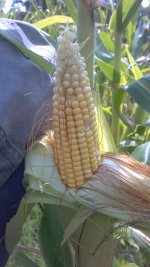ChattBuck
Senior Member
So last night I'm getting my dove field planted and I ended up about 3/4 acre short on corn seed. We buy roundup ready corn seed. But it's 8 oclock at night when I run out and I can't get any more.
I did have a bag of feed corn. Thinking I read here that much of the feed corn is roundup ready corn I went ahead and put in about 4 rows of it as an experiment.
Got a bag of the confirmed roundup ready corn today to finish out the field.
Anyone here got experience just planting feed corn? Did it come up? Was it roundup resistant? Am I just an idiot for thinking it may be?
I did have a bag of feed corn. Thinking I read here that much of the feed corn is roundup ready corn I went ahead and put in about 4 rows of it as an experiment.
Got a bag of the confirmed roundup ready corn today to finish out the field.
Anyone here got experience just planting feed corn? Did it come up? Was it roundup resistant? Am I just an idiot for thinking it may be?



